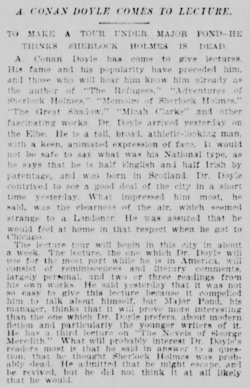A. Conan Doyle Comes to Lecture
A. Conan Doyle Comes to Lecture is an article published in the New-York Tribune on 3 october 1894.
A. Conan Doyle Comes to Lecture

To make a tour under Major Pond - He thinks Sherlock Holmes is dead.
A. Conan Doyle has come to give lectures. His fame and his popularity have preceded him, and those who will hear him know him already as the author of "The Refugees," "Adventures of Sherlock Holmes," "Memoirs of Sherlock Holmes," "The Great Shadow," "Micah Clarke," and other fascinating works. Dr. Doyle arrived yesterday on the Elbe. He is a tall, broad, athletic-looking man, with a keen, animated expression of face. It would not be safe to say what was his National type, as he says that he is half English and half Irish by parentage, and was born in Scotland. Dr. Doyle contrived to see a good deal of the city in a short time yesterday. What impressed him most, he said, was the clearness of the air, which seemed strange to a Londoner. He was assured that he would feel at home in that respect when he got to Chicago.
The lecture tour will begin in this city in about a week. The lecture, the one which Dr. Doyle will use for the most part while he is in America, will consist of reminiscences and literary comments, largely personal, and two or three readings from his own works. He said yesterday that it was not so easy to give this lecture because it compelled him to talk about himself, but but Major Pond, his manager, thinks that it will prove more interesting than the one which Dr. Doyle prefers, about modern fiction and particularly the younger writers of it. He has a third lecture on "The Novels of George Meredith." What will probably interest Dr. Doyle's readers most is that he said in answer to a question, that he thought Sherlock Holmes was probably dead. He admitted that he might escape, and be revived, but he did not think it at all likely that he would.